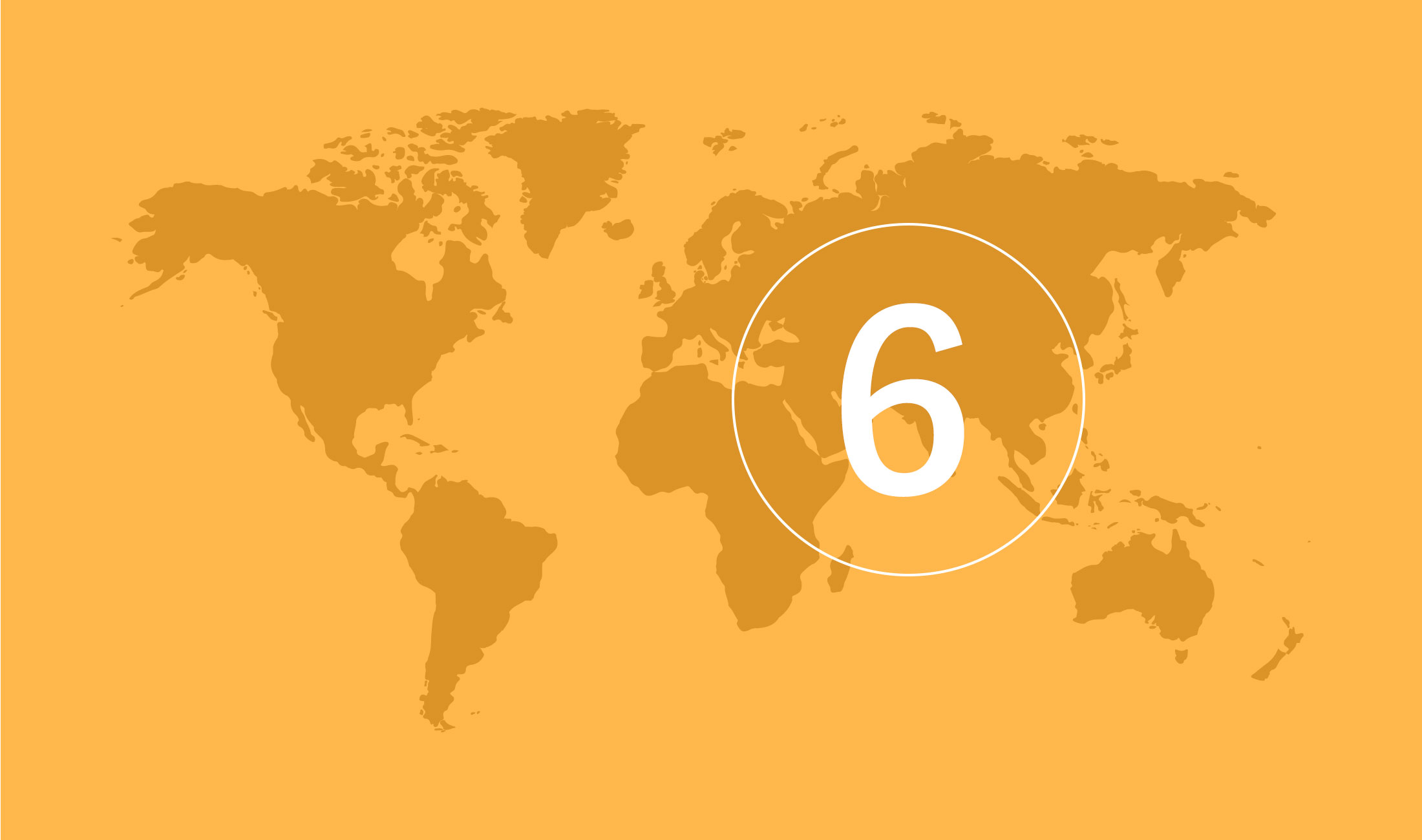
Tanzania
Category
6
- 0
- 1
- 2
- 3
- 4
- 5
- 6
- 7
| Risk type | Short | Long |
|---|---|---|
| Sovereign |

|

|
| Public |

|

|
| Bank |

|

|
| Corporate |

|

|
The icons indicate EKN's risk assessment.

No policy established

Normal risk assessment

Restrictive risk assessment

Normally off cover

OECD or EU countries
Country risk analysis
Country risk analysis archive
Country Risk Analysis of Tanzania
The latest Country Risk Analysis of Tanzania was issued in June 2024.
Background
Since 2010, growth in the Tanzanian economy has been high, averaging about 6 per cent per year. The economy is relatively well diversified with strong growth potential, not least thanks to high savings and investments compared to most economies on the continent. From a regional perspective, Tanzania enjoys macroeconomic stability and stable public finances. Inflation is below average for the region and interest rates have fallen significantly since 2017.
While there is an upward trend in the debt-to-GDP ratio, the rate of increase is significantly lower than in other African economies that, like Tanzania, have invested in major infrastructure projects. One explanation is that compared to many other African countries, the Tanzanian Ministry of Finance is relatively restrictive when it comes to external borrowing and sovereign guarantees.
The extensive bureaucracy also slows decisions on external borrowing, which, like most other decisions in Tanzania, are subject to an extensive consultative process. External liquidity is relatively good thanks to significant hard currency earnings and limited external debt. Tanzania’s major export commodity is gold, which accounts for approximately 30 per cent of exports.
The risk profile, on the other hand, is dominated by weak institutions and a difficult business environment, including widespread corruption. According to the World Bank’s Worldwide Governance Indicators (WGIs), Tanzania’s institutions are ranked in the bottom third globally, and there are general shortcomings in the administration of the country. The large agricultural sector exposes the country to climate change-related risks, in particular droughts, storms and floods. Low-income levels and relatively weak institutional capacity mean that Tanzania has limited opportunities to prevent these risks.
Climate transition risks are moderate with the exception of large gas deposits, the extraction of which may prove more difficult to finance in the future. There has also been extensive international criticism of the East African Crude Oil Pipeline (EACOP), which will transport oil from Uganda’s Lake Albert oilfields to the Tanzanian port of Tanga.
The dominant political party is Chama Cha Mapinduzi (CCM), which, together with its predecessor the Tanganyika African National Union (TANU), has ruled the country since independence. Samia Suluhu Hassan has been president since 2021. Under Hassan, Tanzania has engaged in a more active foreign policy, the business climate has been less erratic than under the previous administration of President Magufuli, and steps have been taken towards greater political freedom. Generally, however, policy changes under Hassan are expected to be limited. The CCM remains largely synonymous with the state, and political freedom is severely restricted.
The shilling remains under pressure
Tanzania is still benefiting from high gold and mineral prices, a relatively robust macroeconomy and the thawing of the business climate under President Hassan. Despite what is still a rigid business environment, the economy is expected to grow by approximately 6 per cent annually during the period 2024–2026. Inflation is on the rise, which triggered an interest rate hike from the Bank of Tanzania in April 2024, but the IMF forecasts that long-term inflation will stabilise at 4 per cent.
This remains below the Bank of Tanzania’s long-term target of 5 per cent and is low for the region. The Bank of Tanzania introduced a benchmark interest rate in January 2024 as part of a new monetary policy framework, replacing monetary supply as a policy instrument for controlling inflation. The new system thus complies with regional and international standards.
A strong US dollar, high global inflation and significant imports for the country’s infrastructure projects have led to imports increasing faster than exports in recent years. As a consequence, the supply of hard currency was rationed in 2023/24, an unusual measure in Tanzania but in line with the overall trend on the African continent. From August to October 2023, banks stopped selling hard currency on the Inter-Bank Foreign Exchange Market (IFEM). This left the Bank of Tanzania as the sole seller, but they too were forced to introduce rationing due to dwindling reserves, thus reducing hard currency liquidity in the system. This has made it difficult for importing companies to secure foreign currency; in some cases, only 30 per cent of the invoiced amount could be covered, as witnessed by EKN in several transactions.
A small parallel foreign exchange market has appeared during 2023/24, charging a premium of approximately 10 per cent above the official exchange rate. A number of factors do however suggest that the shortage of hard currency will be temporary. Inflation is beginning to fall globally, and the US dollar may be weakened when the Federal Reserve begins to lower its benchmark interest rate. Tanzania’s current account deficit is expected to decrease from 4.6 per cent of GDP in 2024 to 3.1 per cent in 2026, partly due to fewer imports for government infrastructure projects.
The 2,115 MW-capacity Julius Nyerere Hydropower Project, which is under construction in central Tanzania, is ready to begin production and fewer imports are therefore required. In addition, according to President Hassan, the first two stages of the Tanzania Standard Gauge Railway (SGR) will open in July 2024. Although the central bank reserve has decreased over recent years, it remains at a satisfactory level, covering approximately 4 months of imports. There is thus a significant amount of hard currency in the country. The Tanzanian shilling has fallen in value by around 10 per cent since April 2023 and is moving more freely against the US dollar than previously, which is positive for hard currency liquidity.
While public finances are relatively stable, low tax revenues and weak budgetary planning and administration continue to present long-term problems. The fiscal deficit is moderate at just under 3 per cent, while public debt is expected to fall to the equivalent of 43 per cent of GDP in 2026. Nor is the cost of public debt alarmingly high at just over 12 per cent of budget revenue. Thus far, Tanzania is complying with the recommendations in the Extended Credit Facility
Arrangement (2022–) agreed with the IMF, which is credit risk positive.
Few changes are expected at a political level in the coming years. The ruling CCM party will retain power in the 2025 election, which is likely to mean another five-year term for President Hassan. This would be the first electoral victory for Hassan, who acceded to the presidency when Magufuli died in office. Although political gatherings are now permitted throughout the country, unlike the elections of 2015 and 2020, there is no real opposition on the mainland and the CCM has an obvious advantage in what has for all intents and purposes been a one-party state.
That said, Hassan is not markedly popular, either with the people or within her own party, and there is no shortage of challengers. Despite the expansion of the national grid, power cuts have followed one after the other over the last year, while Dar es Salaam has been without running water for periods of time. Large parts of the population have suffered both floods and drought, a situation that is likely to deteriorate with climate change.
There are also indications that corruption has increased under Hassan, which reflects poorly on the President given that Magufuli was renowned as a zealous opponent of corruption. In all likelihood, the elections will be free, but not fair. There is a risk that the election in the semi-autonomous province of Zanzibar will be both controversial and violent given the struggle that the CCM will have to undergo to secure victory. The 2020 election was marred by manipulation, election fraud and violence. Zanzibar, which is autonomous in matters unrelated to the Union of Tanzania, elects its own president, making the election vital to the CCM.
Overall, the outlook for the country risk classification of Tanzania is weakly positive, meaning that an upgrade to country risk category 5 is possible within the next fewyears. Factors that may trigger an upgrade are further improvements in political leadership, the business environment and public finances.
Business environment
Under President Hassan, political leadership has become more predictable, the country’s tax agency (the Tanzania Revenue Authority) has been less politicised and cross-border trade has increased thanks to improved relations with neighbouring countries. Rules and regulations on work permits for investors and foreign entrepreneurs have also been relaxed. This has made businesses more confident about the future and once again willing to make long-term investments.
Investment will continue in the rail network, hydroelectric power and the national grid. Major investments will be made in the coming years, including the Standard Gauge Railway sections from Dar es Salaam to Mwanza and the 1,443 km East African Crude Oil Pipeline from Uganda. Meanwhile, the business and regulatory environment in Tanzania remains difficult, characterised as it is by weak institutions, extensive bureaucracy and corruption.
Trends in the WGIs are largely unchanged over the last decade, apart from the WGI Control of Corruption, where Tanzania’s percentile rank improved from 23 in 2013 to 43 in 2022. Particular challenges described by companies with experience of the country include incomprehensible and bureaucratic tax administration, opaque permit and licence processes, inadequate regulation and a deficient legal system, as well as generally aggravating government interference in the business sector. There is still scepticism towards international companies, and the rules for obtaining local mineral rights are implemented haphazardly.
Compared to neighbouring Kenya, for example, the business environment is significantly more bureaucratic, complicated and unpredictable. Dar es Salaam Port is inefficient. Despite easy access to maritime transport, the cost of exporting from Tanzania can be five times higher than from, for example, landlocked Uganda.
EKN’s policy
EKN applies normal risk assessment for sovereign risks, corporate risks and bank risks. This applies to both short and long-term risks. In the case of other public risks, such as ministries or public authorities, EKN requires a letter of credit or a bank or sovereign guarantee.
EKN’s commitment and experience
EKN’s exposure consists almost exclusively of one EPC transaction worth almost SEK 2 billion for the expansion of the railway network. Other than that, there is a wide range of smaller transactions in the mining, paper, transport and energy industries. Over the past five years, EKN has issued an average of just over 50 guarantees per year, mainly framework guarantees. Generally speaking, EKN:s payment experience is positive.
Payment delaysincreased slightly in 2023, largely due to increasing pressure on hard currency reserves, but this has not resulted in any indemnifications. Current payment delays (SEK 3.5 million) mainly relate to the paper industry and hard currency. Indemnifications of SEK 45 million mainly relate to two transactions in the transport industry from 2015 and 2016, the debtor being a small local oil company. The reason for the delay in payment and subsequent indemnification was stated to be a sharp decline in sales, i.e. a commercial loss.
EKN also has indemnifications of just under SEK 9 million relating to mining transactions between 2011 and 2017. EKN entered into four Paris Club agreements with Tanzania between 1986 and 1993. However, Sweden was among the creditors when Tanzania was granted debt relief under the Heavily Indebted Poor Countries (HIPC) initiative in the early 2000s.
Learn more about exporting to Tanzania

- Sustainability
- Financing
Fastest railway in East Africa
A new railroad with high-speed trains is connecting the coast of Tanzania to the centre of the country. Attractive financing and a comprehensive sustainability and environmental agenda render the multi-billion dollar project a showcase to the entire continent. Here’s how.
Fastest railway in East AfricaMore for companies that want to export to Tanzania

EKN's guarantees
EKN's guarantees reduce the risk of payment defaults and help banks support businesses. Which guarantee suits your needs?
EKN's guarantees
Guarantee guide
Are you unsure which guarantee is the best fit for your specific transaction? Try our guarantee guide.
Guarantee guide